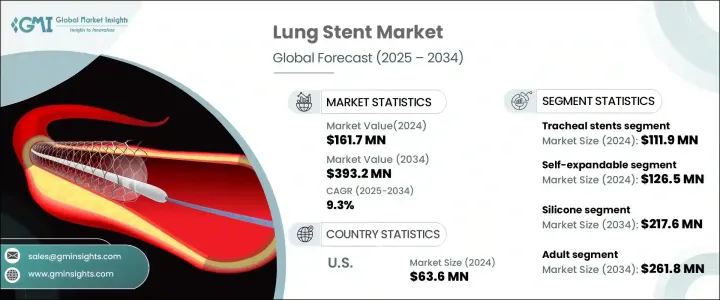
|
시장보고서
상품코드
1684869
폐 스텐트 시장 : 시장 기회, 성장 촉진요인, 산업 동향 분석, 예측(2025-2034년)Lung Stent Market Opportunity, Growth Drivers, Industry Trend Analysis, and Forecast 2025 - 2034 |
||||||
세계의 폐 스텐트 시장은 2024년에 1억 6,170만 달러로 평가되었고, 2025년부터 2034년까지 CAGR 9.3%로 강력한 성장률을 나타낼 것으로 예측되고 있습니다.
이러한 급속한 시장 확대는 만성 호흡기 질환의 유병률 증가, 저침습 수술의 진보, 혁신적인 의료 기술 개발을 목적으로 하는 투자의 급증과 같은 여러 요인에 기인합니다. 호흡기 질환은 대기오염, 흡연, 앉기 쉬운 라이프스타일 등의 요인에 의해 더욱 광범위하게 확산되고 있습니다. 폐 스텐트는 종양, 감염, 선천성 이상으로 인한 폐색으로 고통받는 환자의 기도 개존성을 유지하고 호흡을 개선하는 데 중요한 역할을 하기 때문에 이러한 상황으로 의해 폐 스텐트에 대한 수요가 증가하고 있습니다.

폐 스텐트는 기도 관리에 효과적인 솔루션을 제공함으로써 환자의 결과를 개선하는 능력이 점점 인정되고 있습니다. 헬스케어의 진화에 따라 회복 시간의 단축, 합병증의 감소, 의료비의 삭감을 실현하는 저침습 치료로의 시프트가 진행되고 있습니다. 기술의 진보로 폐 스텐트는 다양한 기도의 해부학적 구조에 적응할 수 있게 되어, 인공지능을 구사한 화상 처리와 네비게이션 시스템의 통합에 의해 스텐트 유치의 정밀도가 더욱 향상되었습니다. 이러한 기술 통합은 치료 성과와 성공률을 향상시키는 길을 열고 있습니다. 게다가 세계의 고령화에 의해 호흡기계 질환에 걸리기 쉬워지고 있어, 이러한 의료기기 수요가 높아지고 있습니다. 고급 호흡기 치료를 지원하는 정부의 이니셔티브와 유리한 상환 정책도 시장 성장을 뒷받침하고 있습니다.
| 시장 범위 | |
|---|---|
| 시작 연도 | 2024년 |
| 예측 연도 | 2025-2034년 |
| 시작 금액 | 1억 6,170만 달러 |
| 예측 금액 | 3억 9,320만 달러 |
| CAGR | 9.3% |
폐 스텐트 시장은 기관 스텐트, 기관지 스텐트, 후두 스텐트의 세 가지 제품 유형으로 나뉩니다. 기관 스텐트 분야는 2024년 1억 1,190만 달러로 시장을 선도했습니다. 심한 기도 폐색의 치료에 널리 사용되기 때문에 헬스케어 제공업체들 사이에서 가장 선호되는 옵션이 되었습니다. 이 스텐트는 심각한 호흡기 폐색을 즉시 완화하고 중단없는 기류를 보장하며 합병증의 위험을 크게 줄입니다. 그 결과, 기관 스텐트는 긴급 처치 및 계획 처치 모두에서 일반적으로 사용됩니다.
장치 유형에는 자기 확장 스텐트와 풍선 확장 스텐트가 있습니다. 자기 확장 스텐트 부문은 2024년에 1억 2,650만 달러를 창출하였고, 2025년부터 2034년까지 연평균 복합 성장률(CAGR) 9.4%로 성장할 것으로 예상됩니다. 이러한 스텐트는 배치가 쉽고 복잡한 기도 구조에도 적합할 수 있기 때문에 지지됩니다. 자기 확장 스텐트는 유치 시 자동으로 확장되므로 수기 시간이 단축되어 정확한 위치 결정이 가능합니다. 그 신뢰성과 효율성 때문에 기류의 신속한 회복이 중요한 긴급 상황에서 특히 유용합니다.
미국에서 폐 스텐트 시장은 2024년에 6,360만 달러에 이르렀으며, 2034년까지 연평균 복합 성장률(CAGR) 8.8%로 성장할 것으로 예측됩니다. 미국은 첨단 헬스케어 인프라, 폐 질환의 높은 발생률 및 저침습 치료에 대한 관심 증가로 인해 세계 시장을 계속 독점하고 있습니다. AI를 활용한 영상처리 등 첨단 기술의 통합으로 스텐트 유치의 정밀도가 향상되고 이 분야에서 미국의 주도적 지위가 더욱 강화되고 있습니다. 정부의 지원 정책 및 상환의 틀도 미국 시장의 성장 궤도에 크게 기여하고 있습니다.
목차
제1장 조사 방법 및 조사 범위
제2장 주요 요약
제3장 업계 인사이트
- 생태계 분석
- 업계에 미치는 영향요인
- 성장 촉진요인
- 폐암의 유병률 상승
- COPD 및 결핵 후 협착의 발생률 증가
- 비혈관 스텐트 개발을 위한 관민 조직에 의한 투자 증가
- 호흡기 질환에 대한 저침습 수술에 대한 기호 증가
- 업계의 잠재적 위험 및 과제
- 대체 치료의 가용성
- 엄격한 규제
- 성장 촉진요인
- 성장 가능성 분석
- 가격 분석(2024년)
- 규제 상황
- 상환 시나리오
- 기술 전망
- 파이프라인 분석
- Porter's Five Forces 분석
- PESTEL 분석
제4장 경쟁 구도
- 서문
- 기업 매트릭스 분석
- 기업 점유율 분석
- 주요 시장 기업의 경쟁 분석
- 경쟁 포지셔닝 매트릭스
- 전략 대시보드
제5장 시장 추계 및 예측 : 제품별(2021-2034년)
- 주요 동향
- 기관 스텐트
- 기관지 스텐트
- 후두 스텐트
제6장 시장 추계 및 예측 : 디바이스 유형별(2021-2034년)
- 주요 동향
- 자기 확장형
- 풍선 확장형
제7장 시장 추계 및 예측 : 재료별(2021-2034년)
- 주요 동향
- 실리콘
- 금속
- 스테인리스
- 니티놀
- 하이브리드
제8장 시장 추계 및 예측 : 환자별(2021-2034년)
- 주요 동향
- 성인
- 소아
제9장 시장 추계 및 예측 : 최종 사용자별(2021-2034년)
- 주요 동향
- 병원
- 외래수술센터(ASC)
- 기타 최종 사용자
제10장 시장 추계 및 예측 : 지역별(2021-2034년)
- 주요 동향
- 북미
- 미국
- 캐나다
- 유럽
- 독일
- 영국
- 프랑스
- 스페인
- 이탈리아
- 네덜란드
- 아시아태평양
- 중국
- 일본
- 인도
- 호주
- 한국
- 라틴아메리카
- 브라질
- 멕시코
- 아르헨티나
- 중동 및 아프리카
- 남아프리카
- 사우디아라비아
- 아랍에미리트(UAE)
제11장 기업 프로파일
- Boston Medical Products
- Boston Scientific
- HEALTH MICROPORT MEDICAL
- COOK GROUP
- EFER ENDOSCOPY
- HOOD LABORATORIES
- mi-TECH
- MERIT MEDICAL
- MICRO-TECH ENDOSCOPY
- NOVATECH
- STENING
- TaeWoong MEDICAL
- Teleflex
The Global Lung Stent Market, valued at USD 161.7 million in 2024, is projected to experience a robust growth rate of 9.3% CAGR from 2025 to 2034. This rapid market expansion can be attributed to several factors, including the rising prevalence of chronic respiratory diseases, advancements in minimally invasive procedures, and a surge in investments aimed at developing innovative medical technologies. Respiratory conditions are becoming more widespread, driven by factors like air pollution, smoking, and sedentary lifestyles. These conditions have led to an increased demand for lung stents, as they play a crucial role in maintaining airway patency and improving breathing for patients suffering from blockages caused by tumors, infections, or congenital abnormalities.

Lung stents are increasingly recognized for their ability to improve patient outcomes by offering effective solutions for airway management. As healthcare systems evolve, there is a growing shift toward minimally invasive treatments that provide quicker recovery times, reduced complications, and lower healthcare costs. Technological advancements have made lung stents more adaptable to various airway anatomies, and the integration of artificial intelligence-driven imaging and navigation systems has further enhanced the precision of stent placement. This technological integration is paving the way for better treatment outcomes and success rates. Additionally, the aging global population is more vulnerable to respiratory diseases, contributing to a higher demand for such medical devices. Government initiatives supporting advanced respiratory care and favorable reimbursement policies are also fueling the market's growth.
| Market Scope | |
|---|---|
| Start Year | 2024 |
| Forecast Year | 2025-2034 |
| Start Value | $161.7 Million |
| Forecast Value | $393.2 Million |
| CAGR | 9.3% |
The lung stent market is divided into three product types: tracheal, bronchial, and laryngeal stents. The tracheal stents segment led the market with USD 111.9 million in 2024. Their widespread use in treating severe airway obstructions has made them the most preferred choice among healthcare providers. These stents offer immediate relief in cases of critical respiratory blockages, ensuring uninterrupted airflow and significantly reducing the risk of complications. As a result, tracheal stents are commonly used in both emergency and planned procedures.
Device type segmentation includes self-expandable and balloon-expandable stents. The self-expandable stents segment generated USD 126.5 million in 2024 and is expected to grow at a CAGR of 9.4% between 2025 and 2034. These stents are favored for their ease of deployment and their ability to conform to complex airway structures. Upon placement, self-expandable stents automatically expand, cutting down procedural time and ensuring accurate positioning. Their reliability and efficiency make them especially valuable in emergency scenarios where quick restoration of airflow is critical.
In the U.S., the lung stent market reached USD 63.6 million in 2024 and is anticipated to grow at a CAGR of 8.8% through 2034. The U.S. continues to dominate the global market, thanks to its advanced healthcare infrastructure, high incidence of lung diseases, and increasing focus on minimally invasive treatments. The integration of cutting-edge technologies, such as AI-driven imaging, is improving the precision of stent placements, further bolstering the country's leading position in this sector. Supportive government policies and reimbursement frameworks are also contributing significantly to the U.S. market's growth trajectory.
Table of Contents
Chapter 1 Methodology and Scope
- 1.1 Market scope and definitions
- 1.2 Research design
- 1.2.1 Research approach
- 1.2.2 Data collection methods
- 1.3 Base estimates and calculations
- 1.3.1 Base year calculation
- 1.3.2 Key trends for market estimation
- 1.4 Forecast model
- 1.5 Primary research and validation
- 1.5.1 Primary sources
- 1.5.2 Data mining sources
Chapter 2 Executive Summary
- 2.1 Industry 3600 synopsis
Chapter 3 Industry Insights
- 3.1 Industry ecosystem analysis
- 3.2 Industry impact forces
- 3.2.1 Growth drivers
- 3.2.1.1 Rising prevalence of lung cancer
- 3.2.1.2 Growing incidence of COPD and post-tuberculosis stenosis
- 3.2.1.3 Increasing investments by the public and private organizations for the development of non-vascular stents
- 3.2.1.4 Growing preference for minimally invasive surgeries for respiratory disorders
- 3.2.2 Industry pitfalls and challenges
- 3.2.2.1 Availability of alternative substitute treatment
- 3.2.2.2 Stringent regulations
- 3.2.1 Growth drivers
- 3.3 Growth potential analysis
- 3.4 Pricing analysis, 2024
- 3.5 Regulatory landscape
- 3.6 Reimbursement scenario
- 3.7 Technology landscape
- 3.8 Pipeline analysis
- 3.9 Porter’s analysis
- 3.10 PESTEL analysis
Chapter 4 Competitive Landscape, 2024
- 4.1 Introduction
- 4.2 Company matrix analysis
- 4.3 Company market share analysis
- 4.4 Competitive analysis of major market players
- 4.5 Competitive positioning matrix
- 4.6 Strategy dashboard
Chapter 5 Market Estimates and Forecast, By Product, 2021 - 2034 ($ Mn)
- 5.1 Key trends
- 5.2 Tracheal stents
- 5.3 Bronchial stents
- 5.4 Laryngeal stents
Chapter 6 Market Estimates and Forecast, By Device Type, 2021 - 2034 ($ Mn)
- 6.1 Key trends
- 6.2 Self-expandable
- 6.3 Balloon-expandable
Chapter 7 Market Estimates and Forecast, By Material, 2021 - 2034 ($ Mn)
- 7.1 Key trends
- 7.2 Silicone
- 7.3 Metal
- 7.3.1 Stainless steel
- 7.3.2 Nitinol
- 7.4 Hybrid
Chapter 8 Market Estimates and Forecast, By Patient, 2021 - 2034 ($ Mn)
- 8.1 Key trends
- 8.2 Adult
- 8.3 Pediatric
Chapter 9 Market Estimates and Forecast, By End Use, 2021 - 2034 ($ Mn)
- 9.1 Key trends
- 9.2 Hospitals
- 9.3 Ambulatory surgical centers
- 9.4 Other end users
Chapter 10 Market Estimates and Forecast, By Region, 2021 - 2034 ($ Mn)
- 10.1 Key trends
- 10.2 North America
- 10.2.1 U.S.
- 10.2.2 Canada
- 10.3 Europe
- 10.3.1 Germany
- 10.3.2 UK
- 10.3.3 France
- 10.3.4 Spain
- 10.3.5 Italy
- 10.3.6 Netherlands
- 10.4 Asia Pacific
- 10.4.1 China
- 10.4.2 Japan
- 10.4.3 India
- 10.4.4 Australia
- 10.4.5 South Korea
- 10.5 Latin America
- 10.5.1 Brazil
- 10.5.2 Mexico
- 10.5.3 Argentina
- 10.6 Middle East and Africa
- 10.6.1 South Africa
- 10.6.2 Saudi Arabia
- 10.6.3 UAE
Chapter 11 Company Profiles
- 11.1 Boston Medical Products
- 11.2 Boston Scientific
- 11.3 HEALTH MICROPORT MEDICAL
- 11.4 COOK GROUP
- 11.5 EFER ENDOSCOPY
- 11.6 HOOD LABORATORIES
- 11.7 mi-TECH
- 11.8 MERIT MEDICAL
- 11.9 MICRO-TECH ENDOSCOPY
- 11.10 NOVATECH
- 11.11 STENING
- 11.12 TaeWoong MEDICAL
- 11.13 Teleflex



















